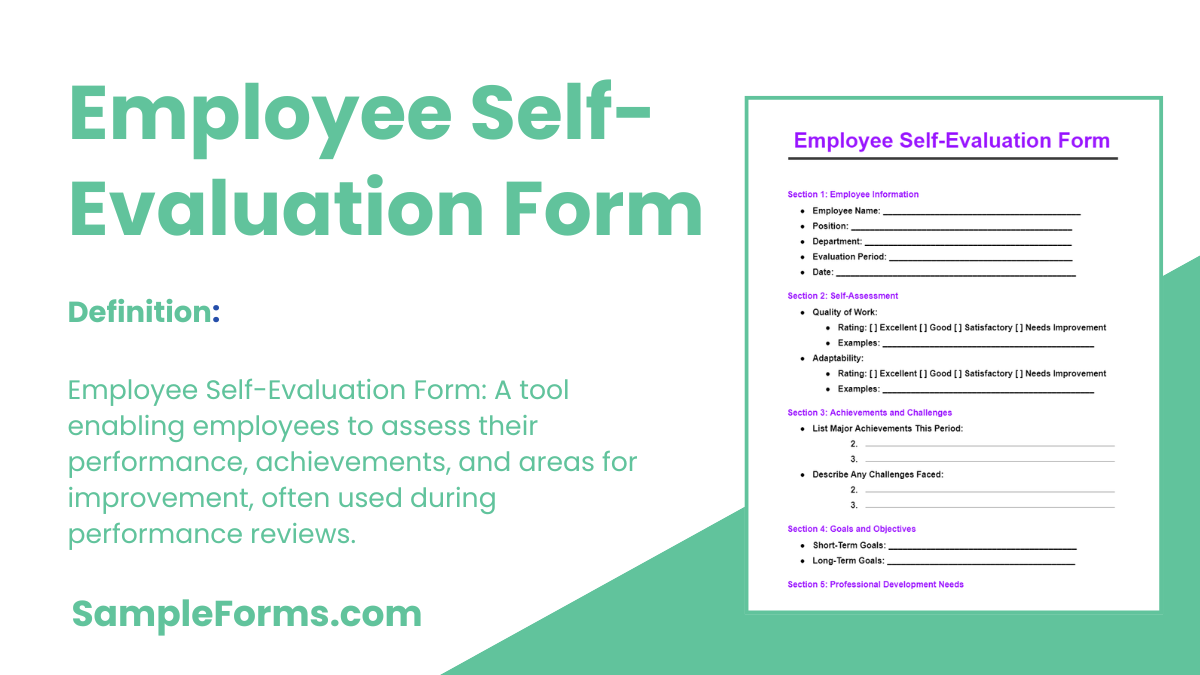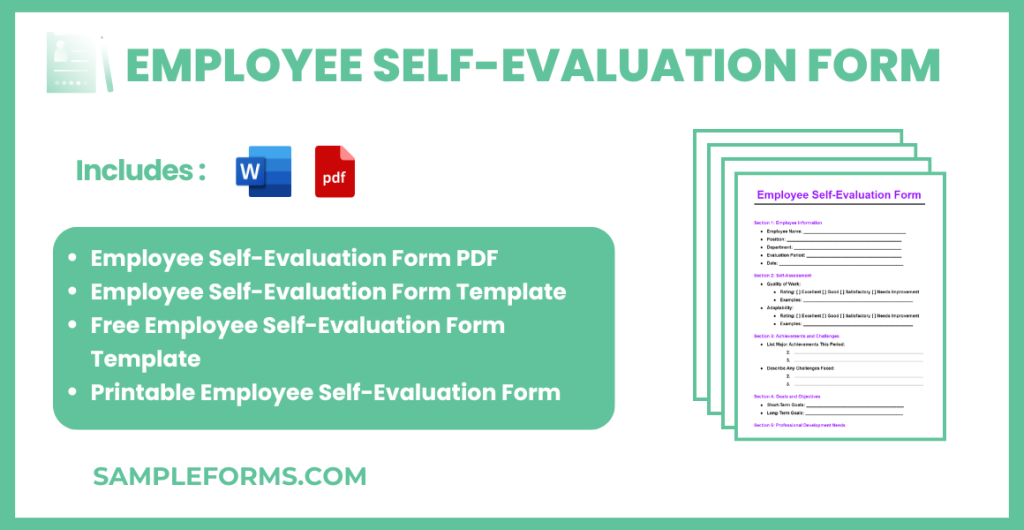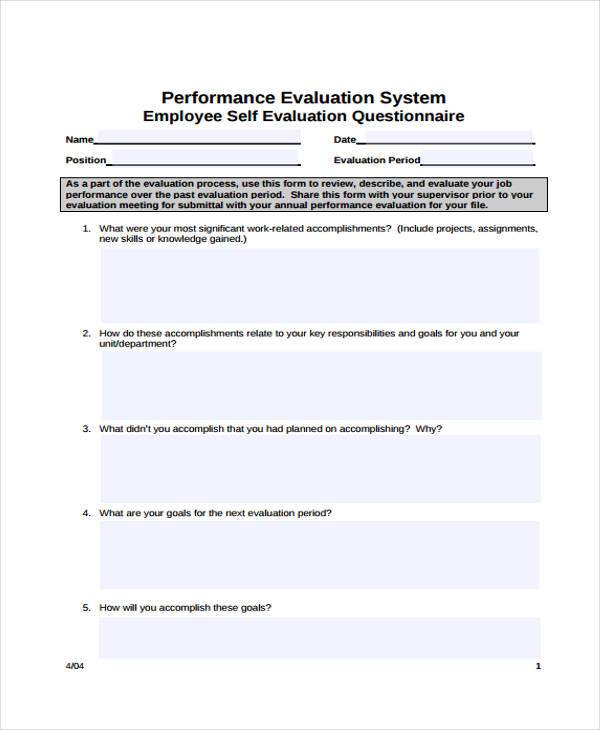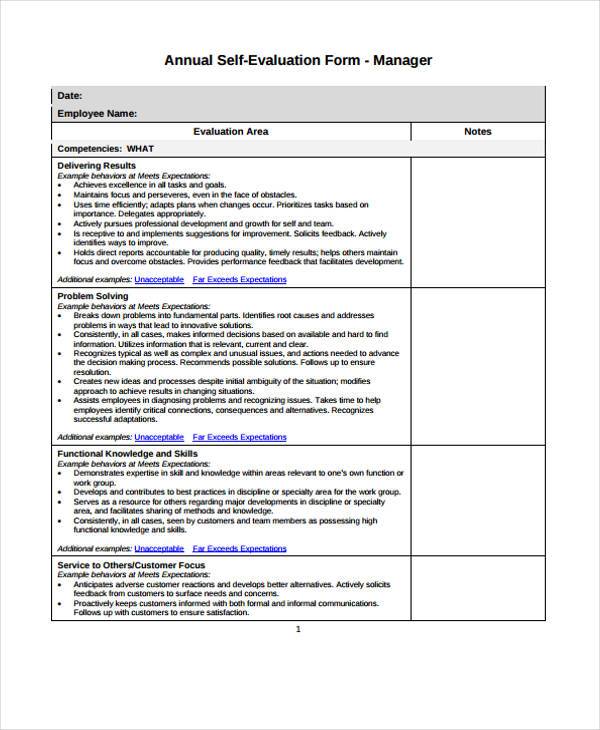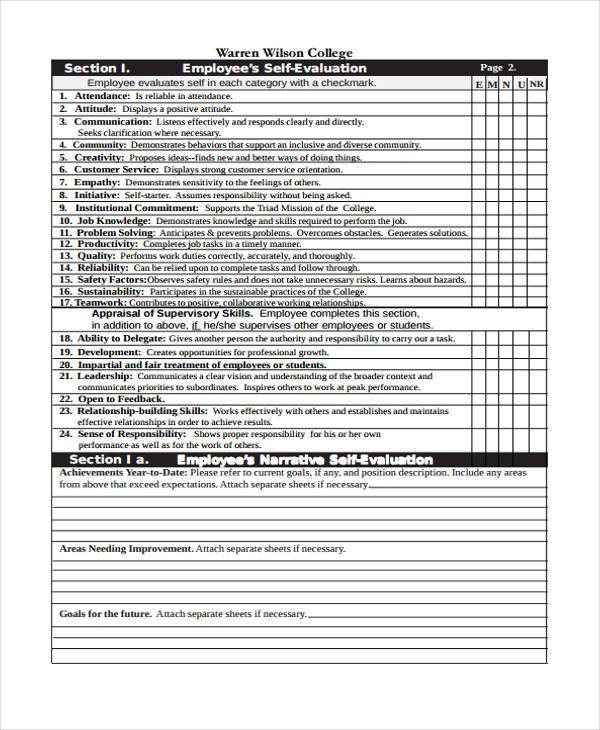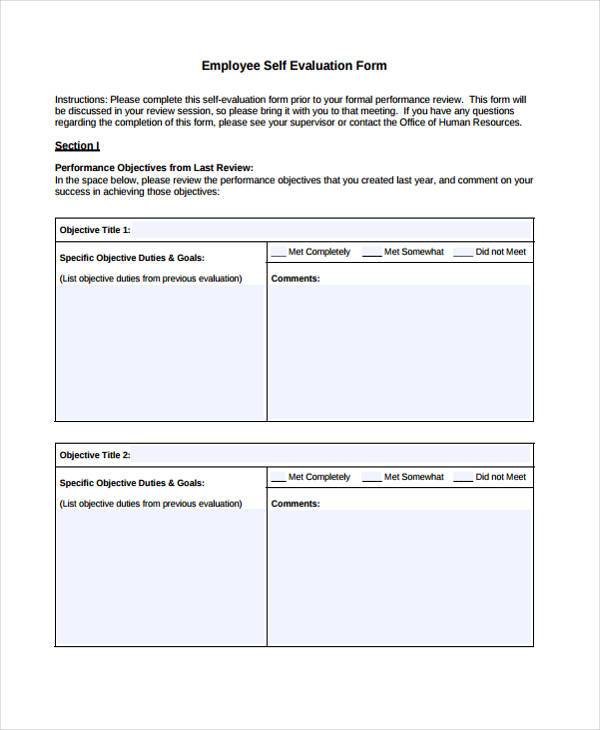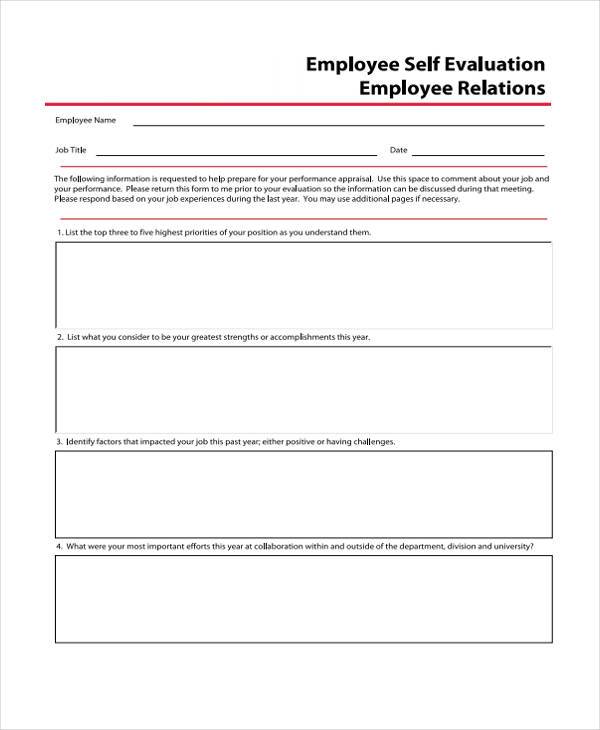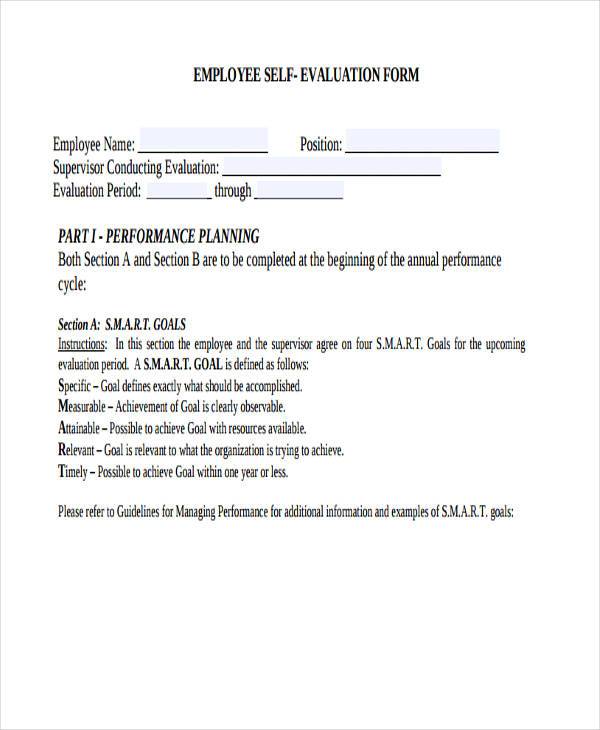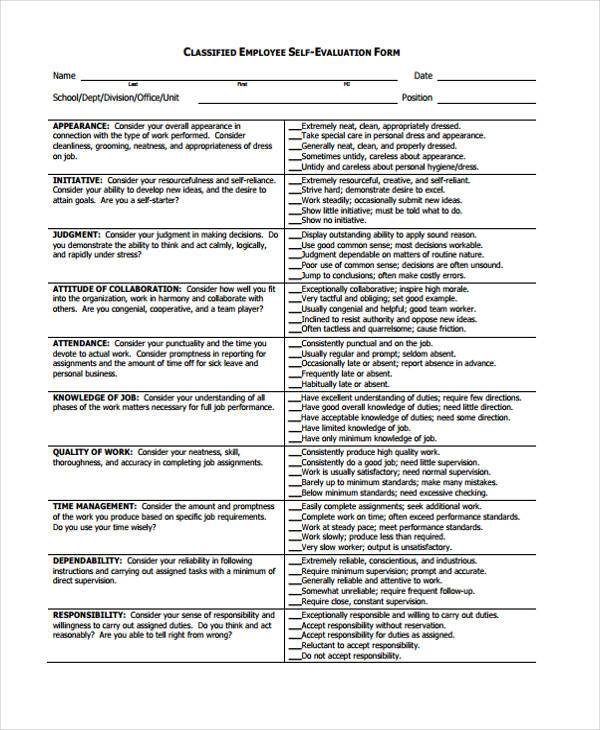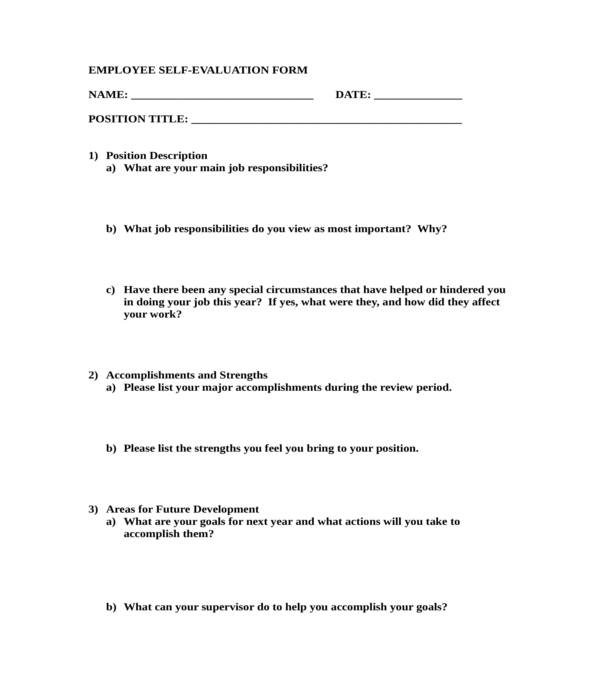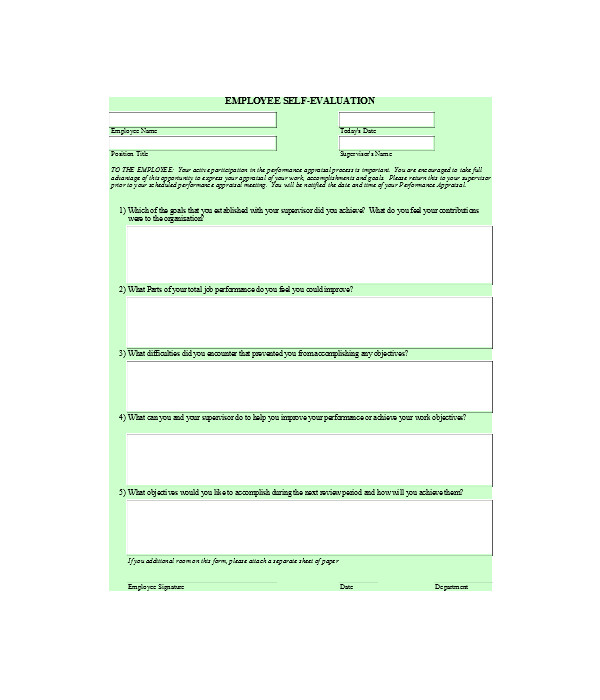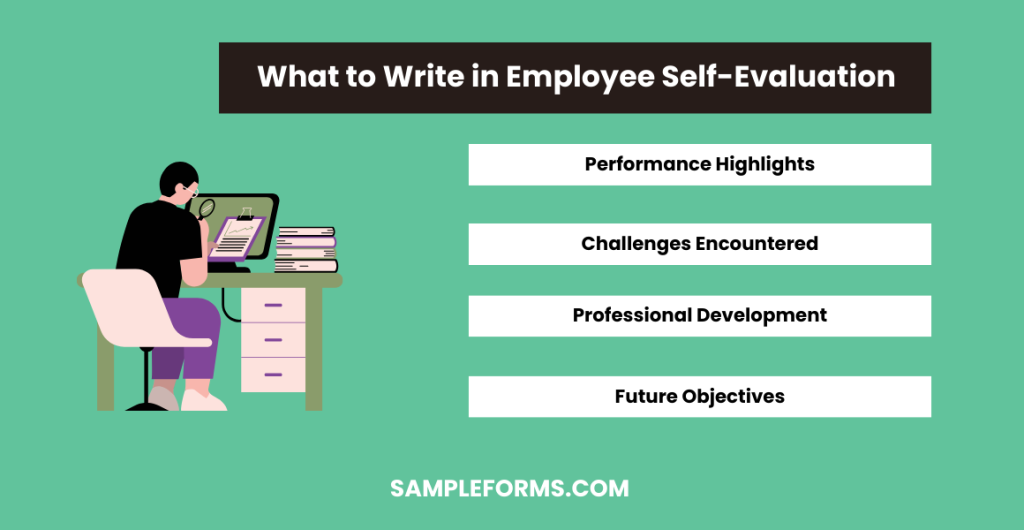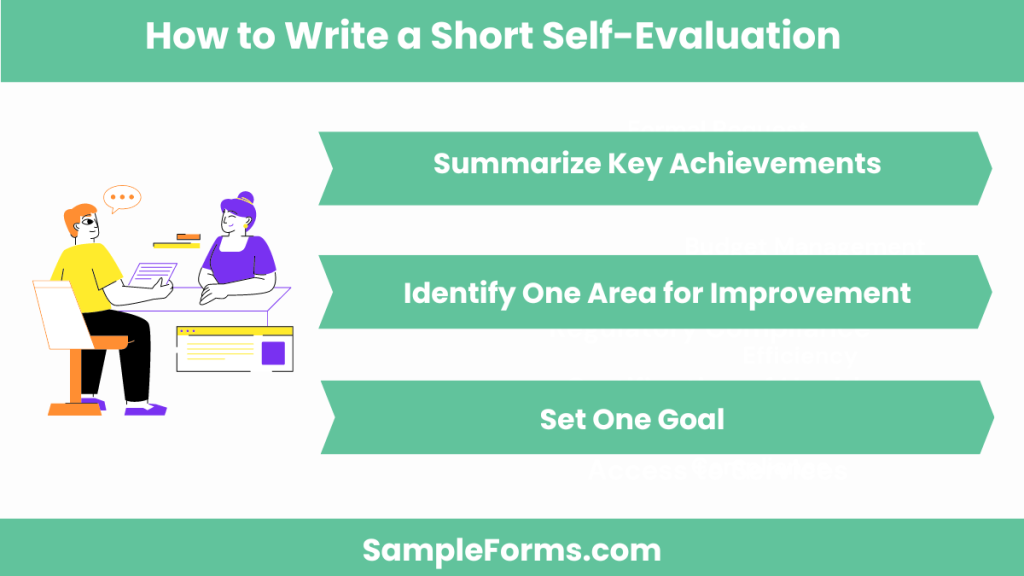An Employee Self-Evaluation Form is an essential tool for personal and professional development within any organization. This form enables individuals to reflect on their performance, identify strengths, and acknowledge areas needing improvement. By integrating the words Employee Form and Self Evaluation Form into regular HR practices, companies can foster a culture of continuous growth and open communication. This guide will walk you through various types of self-evaluations with practical examples to demonstrate their effectiveness in enhancing employee engagement and productivity. Employing such strategic assessments aligns personal achievements with organizational goals, paving the way for career advancement and improved job satisfaction.
What is an Employee Self-Evaluation Form?
An Employee Self-Evaluation Form is a document that employees use to assess their job performance over a specific period. This self-assessment allows individuals to reflect on their achievements, challenges, and areas for professional development. The form typically includes sections for rating oneself against predetermined performance metrics and space for writing detailed comments. The primary aim is to engage employees in their own development by making them active participants in the evaluation process. This introspection not only helps employees recognize their value within the company but also highlights the areas where they can improve to meet their career objectives.
Download Employee Self-Evaluation Form Bundle
Employee Self-Evaluation Format
Employee Details
- Employee Name: (Field for full name)
- Position: (Field for job title)
- Department: (Field for department name)
- Evaluation Period: (Field for the start and end date of the evaluation period)
Performance Criteria
- Job Knowledge and Skills:
- Rate your proficiency and provide examples.
- Work Quality:
- Evaluate the accuracy, thoroughness, and reliability of your work.
- Initiative:
- Describe instances where you have taken initiative.
- Communication Skills:
- Assess your effectiveness in communication.
- Overall Performance:
- Provide an overall self-assessment.
Goals for Next Period
- Professional Development:
- Outline goals for skill enhancement.
- Performance Improvements:
- List areas for improvement and strategies to achieve them.
Employee Self-Evaluation Form PDF
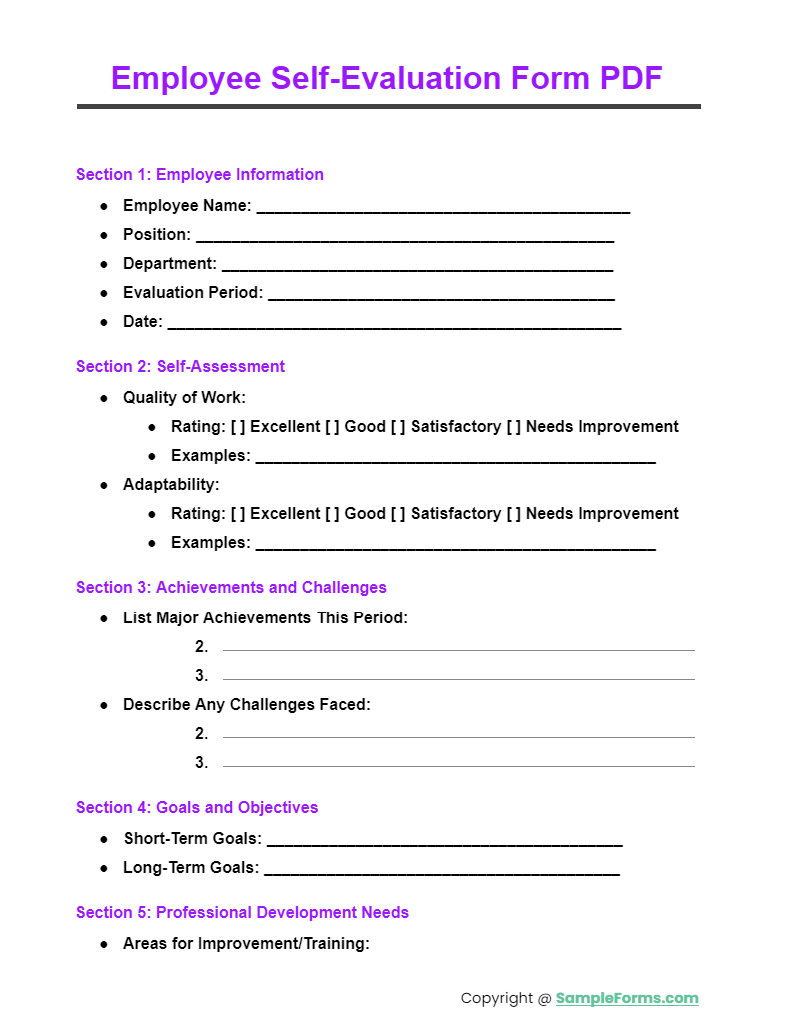
Download our Employee Self-Evaluation Form PDF to guide your self-appraisal process effectively, incorporating essential elements of a Self Appraisal Form for insightful feedback.
Employee Self-Evaluation Form Template
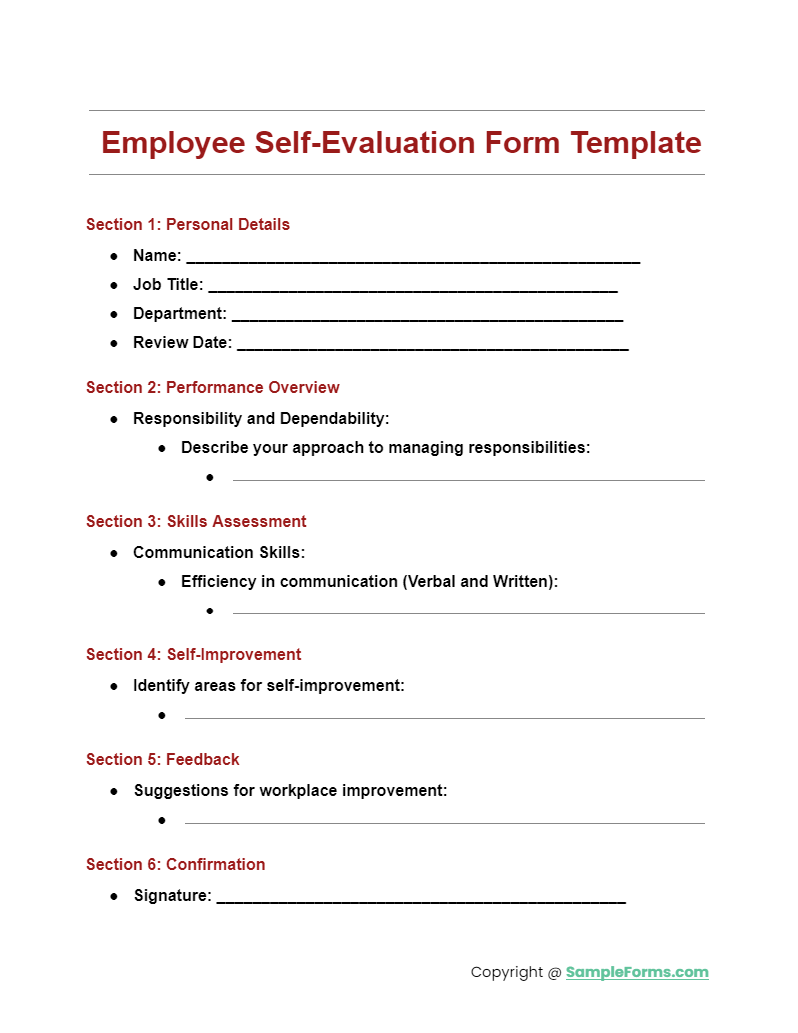
Utilize our Employee Self-Evaluation Form Template, designed to streamline your review process by integrating critical components of a Self-Employment Form for comprehensive self-reporting.
Free Employee Self-Evaluation Form Template
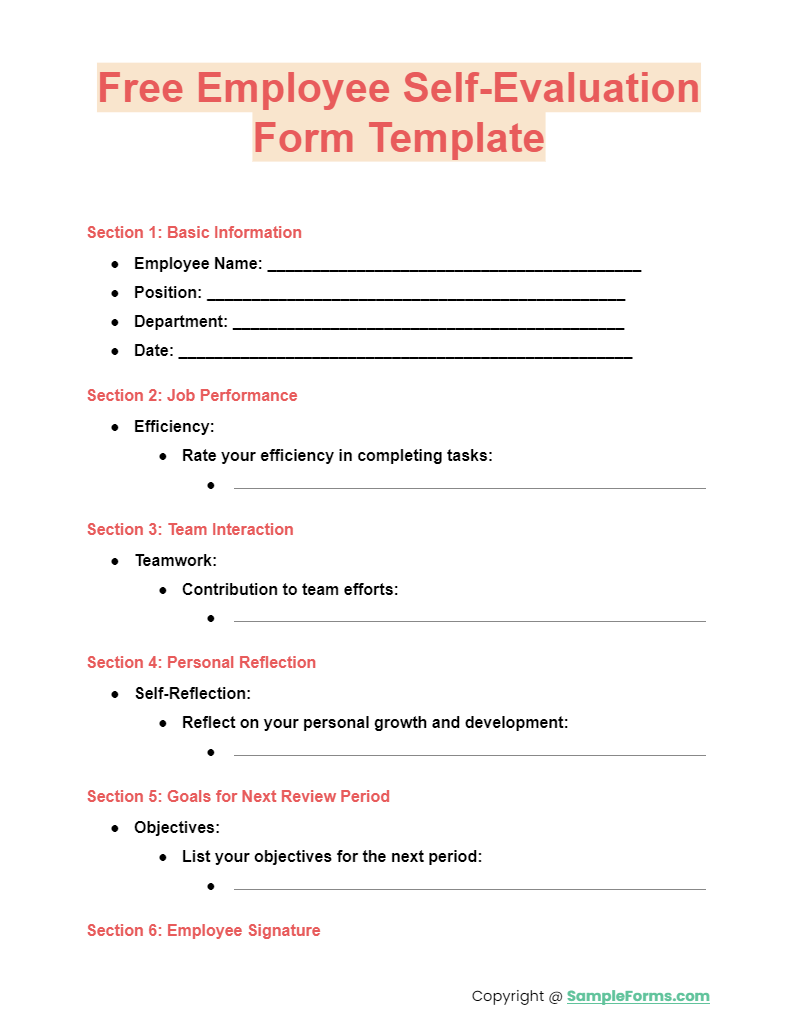
Access our Free Employee Self-Evaluation Form Template to empower your self-assessment practices. This template includes features of a Self-Certification Form, ensuring thorough self-evaluations.
Printable Employee Self-Evaluation Form
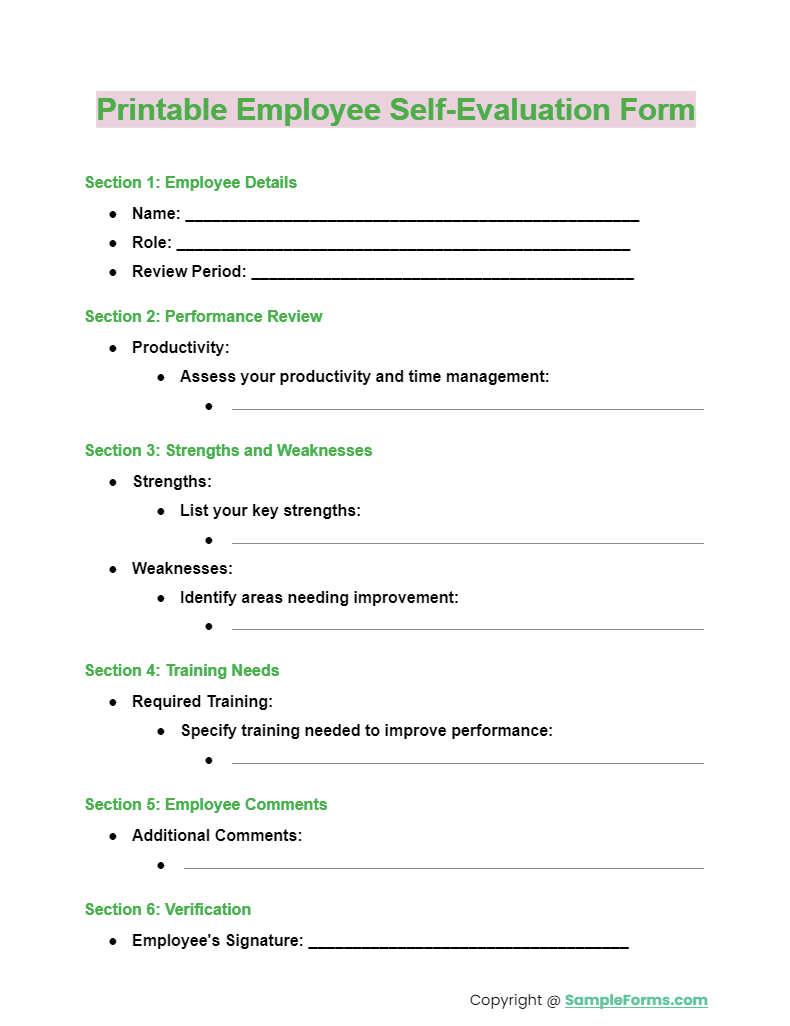
More Employee Self-Evaluation Form Samples
Employee Performance Self-Evaluation Questionnaire
Annual Employee Self-Evaluation Form
Basic Employee Self-Evaluation Form
Printable Employee Self-Evaluation Form
Simple Employee Self-Evaluation Form
Employee Self-Evaluation Form Example
Classified Employee Self-Evaluation Form
Employee Self-Evaluation Form Template
General Employee Self-Evaluation Form
What to Write in Employee Self-Evaluation?
When completing an Employee Self-Evaluation Form, ensure you address key performance areas, achievements, challenges, and goals. Follow these steps:
- Performance Highlights: Summarize your main accomplishments, linking them to specific goals or projects.
- Challenges Encountered: Discuss any obstacles you faced and how you addressed them.
- Professional Development: Describe your efforts in learning and growth, similar to completing a Self-Review Form.
- Future Objectives: Outline your professional goals and plans for achieving them. In addition, you should review our Employee Status Change Form
How to Write Employee Self-Evaluation?
Writing an effective self-evaluation involves reflection and strategic planning. Use this structure:
- Introduction: Start with a brief introduction about your role and time period covered by the evaluation.
- Accomplishments: List your key achievements, mirroring the format of an Employee Information Form.
- Areas for Improvement: Identify areas where you believe you can improve, using examples and specifics.
- Goals for Next Period: Set clear objectives for the upcoming evaluation period. In addition, you should review our Employee Assessment Form
How Do You Write a Short Self-Evaluation?
A concise self-evaluation should still capture essential aspects of your performance. Here’s how:
- Summarize Key Achievements: Focus on one or two major accomplishments. In addition, you should review our Employee Transfer Form
- Identify One Area for Improvement: Highlight a single area where you can enhance your performance.
- Set One Goal: Define one clear, achievable goal for the next period, similar to entries in an Employee Write Up Form.
How Do You Write a Good Self-Evaluation Example?
Writing a compelling self-evaluation involves clear, reflective, and balanced insights. Here’s an example approach:
- Introduction: “As a [Your Position], I have embraced new responsibilities this year.” In addition, you should review our Employee Waiver Form
- Achievements: “I successfully managed and delivered three major projects on time, leading to a 10% increase in department efficiency.”
- Challenges: “Adapting to remote work was challenging; however, I improved my technical skills and communication to stay productive.”
- Goals: “My goal for the next year is to lead a team project, enhancing my leadership skills.” In addition, you should review our Employee Release Form
What Are the 4 Types of Evaluation Example?
The four types of evaluation in a workplace context include:
- Formative Evaluation: Ongoing feedback during the process of a project, similar to a Construction Employee Evaluation Form.
- Summative Evaluation: Final evaluation at a project’s completion, as seen in an Employee Evaluation Form.
- Process Evaluation: Examining the process of execution within a project.
- Impact Evaluation: Assessing the broader effects and outcomes of a project on the organization. In addition, you should review our Employee Address Form
What Are the 3 Main Evaluation Goals?
The primary goals of any evaluation are to:
- Assess Effectiveness: Determine if the objectives were achieved, utilizing tools like an Employee Clearance Form.
- Understand Impact: Measure the impact of actions on the organization and individual growth.
- Inform Decisions: Provide data and insights that help in strategic decision-making. In addition, you should review our Employee Survey Form
What Are the 4 Forms of Evaluation and the Approaches Within Them?
In organizational settings, the four main forms of evaluation, along with their approaches, are:
- Diagnostic Evaluation: Understanding causes and factors behind outcomes, often involving deep dives into data.
- Formative Evaluation: Continuous assessments during project execution to improve processes. In addition, you should review our Employee Termination Form
- Summative Evaluation: End-of-project evaluations summarizing outcomes and successes.
- Impact Evaluation: Long-term evaluation focusing on the consequences and changes brought about by project implementations. In addition, you should review our Employee Performance Review Form
What is the Most Common Form of Employee Evaluation?
The most common form of employee evaluation is the annual performance review, often documented using an Employee Action Form to track progress and feedback. In addition, you should review our Employee Complaint Form
What is an Evaluation Template?
An evaluation template is a pre-designed framework used to guide the assessment process, ensuring consistency and completeness in evaluations, similar to an Employee Correction Form. In addition, you should review our Employee Feedback Form
What Should an Employee Say in a Performance Review?
In a performance review, an employee should highlight achievements, address challenges, set goals, and ask for feedback, akin to completing an Employee Election Form. In addition, you should review our Employee Nomination Form
How to Write Self-Evaluation Sample Answers?
Write self-evaluation sample answers that are honest, specific, result-oriented, and reflective of both successes and areas for improvement, similar to filling out an Employee Tracking Form. In addition, you should review our Employee Satisfaction Survey Form
What Are Sentence Starters for Self-Evaluation?
Effective sentence starters for self-evaluation include “I accomplished…”, “I developed…”, “I learned…”, and “I plan to…”, helping to structure thoughts like entries in an Employee Expense Reimbursement Form. In addition, you should review our Employee Discipline Form
What Should an Evaluation Plan Look Like?
An evaluation plan should outline objectives, methodologies, criteria, timelines, and responsibilities, structured similarly to an Employee Change Form for clarity and accountability. In addition, you should review our Employee Witness Statement Form
What Are the Most Common Evaluation Methods?
The most common evaluation methods include self-assessments, 360-degree feedback, managerial reviews, and objective performance metrics, as detailed in an Employee Reimbursement Form. In addition, you should review our Employee Performance Evaluation Form
Delve into our detailed resources on Employee Self-Evaluation Forms, including diverse samples, customizable forms, and instructional guides. These tools are designed to complement an Employee Contact Form, optimizing communication and documentation processes in HR departments across various industries.
Related Posts
-
Food Sensory Evaluation Form
-
FREE 5+ Substitute Teacher Evaluation Forms in PDF | MS Word | Excel
-
FREE 4+ HR Interview Evaluation Forms in PDF | MS Word | Excel
-
Candidate Evaluation Form
-
FREE 3+ Restaurant Manager Evaluation Forms in PDF
-
Call Monitoring Evaluation Form
-
FREE 5+ General Manager Evaluation Forms in PDF
-
Chef Evaluation Form
-
FREE 8+ Kitchen Evaluation Forms in PDF | MS Word
-
Customer Service Evaluation Form
-
FREE 15+ Grant Evaluation Forms in PDF | MS Word
-
FREE 14+ Volunteer Evaluation Forms in PDF
-
Mentee Evaluation Form
-
Speaker Evaluation Form
-
FREE 14+ Vehicle Evaluation Forms in PDF
